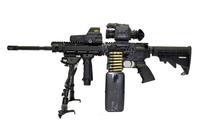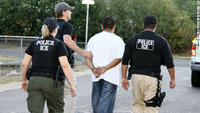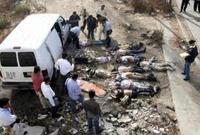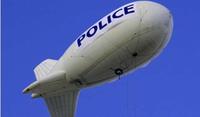-
Free database helps crack cold case from 1984
A cold case investigation into the whereabouts of a man who went missing in 1984 was recently solved with the help of a free online law enforcement database
-
-
Federal prison guard arrests increase nearly 90 percent

Over the past decade, arrests of federal prison guards have increased by nearly 90 percent and misconduct investigations have doubled according to a recently released Justice Department Inspector General report
-
-
Mississippi wildlife officers want bigger guns

The Mississippi Department of Wildlife, Fisheries, and Parks says it needs bigger guns; the agency hopes to purchase 250 high-powered AR-15 assault rifles to boost its crime fighting power and is currently accepting bids
-
-
Immigration raid nets nearly 3,000 illegal immigrants

On Wednesday, federal immigration authorities announced they had detained nearly 3,000 illegal aliens in the largest nation-wide raid of its kind; of the 3,000 aliens arrested, more than 1,600 were felons convicted of crimes like manslaughter, attempted murder, armed robbery, sex crimes against minors, and drug trafficking
-
-
Report finds Texas border violence worsening

A recently released report concludes that violence from the Mexican government’s war against the drug cartels is increasingly spreading into the United States; the report found that as the Mexican military cracks down further on drug cartels, these organizations have pushed further north into Texas to create a “sanitary zone”
-
-
Industry displays unmanned systems to law maker
Of the 19,000 law enforcement agencies in the United States, only about 300 have aviation units; most law enforcement agencies cannot afford several million dollars for a helicopter, as well as the $1,500 per hour to operate it; UAVs offer a cost-effective solution
-
-
NYPD has means to take down a plane "in very extreme situation"
The NYPD created a counterterrorism unit following the 9/11 attacks; New York City Police Commissioner Ray Kelly said that the counterterrorism unit has the means to take down an aircraft “in a very extreme situation”
-
-
Study shows surveillance cameras reduce crime, in some cases

A recent study found that security cameras in urban areas have had mixed results in preventing crime; the study aimed to determine whether installing surveillance cameras to reduce crime is an effective use of scarce resources, especially with states struggling with soaring budget deficits and police departments facing steep cuts; the study found that the efficacy of cameras varies and is largely dependent upon how the surveillance system is set up and monitored
-
-
Aussies want license plate-readers connected to drones
Canberra law enforcement authorities want to begin using UAVs together with license plate readers to track, autonomously, vehicles of interest; the police is considering using speed-detection systems to detect stolen cars or unregistered vehicles — and even integrate them into a broader surface-to-air surveillance network
-
-
Security professionals gear up for GovSec West
Security professionals from across the country are slated to descend upon Phoenix, Arizona for the GovSec West security conference in November; attendees will have the opportunity to participate in educational sessions that focus on securing critical infrastructure, cyber threats, terrorism, and border security
-
-
The Certified Protection Officer (CPO) 8th Edition launched
The updated version of a training course for Certified Protection Officers is now available online; the course and exam provide candidates with the IFPO certification; the course offers training in security technology, laws, trends, and techniques
-
-
To catch a "flash mob"

Catching “flash mobs” has proven to be particularly troublesome for local police officers as they occur and then dissipate so rapidly, but now local authorities are receiving some extra help from DHS
-
-
Ogden, Utah police first-in-nation to use surveillance blimp

A patrol car fitted with all of the police extras cost $40,000; a surveillance blimp will cost well below that — possibly as low as $15,000; after that, it is $100 a week to keep it filled with helium and charge its electric batteries; the police in Ogden, Utah, decides this is a good deal
-
-
Challenging conventional wisdom on border security
Two new papers say that if the United States is serious about border security, then instead of building bigger walls or throwing more resources at empty enforcement efforts, the United States should adopt strategies that address real threats to U.S. border security — drug cartels
-
-
Can citizens legally -- and secretly -- record police officers in action?
Technological advances have raised questions concerning the constitutionality of new police methods (for example, attaching a GPS device to a suspect car without the police first obtaining a warrant to do so); there are legal issues on the other side of the equation — that is, whether or not citizens are constitutionally protected when doing video or audio recording of police officers in action
-
More headlines
The long view
Why Was Pacific Northwest Home to So Many Serial Killers?
Ted Bundy, Gary Ridgway, George Russell, Israel Keyes, and Robert Lee Yates were serial killers who grew up in the Pacific Northwest in the shadow of smelters which spewed plumes of lead, arsenic, and cadmium into the air. As a young man, Charles Manson spent ten years at a nearby prison, where lead has seeped into the soil. The idea of a correlation between early exposure to lead and higher crime rates is not new. Fraser doesn’t explicitly support the lead-crime hypothesis, but in a nimble, haunting narrative, she argues that the connections between an unfettered pollution and violent crime warrant scrutiny.
